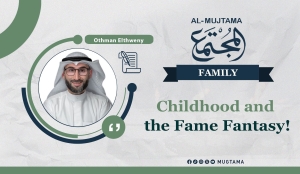Childhood and the Fame Fantasy!
February 09, 2025
In an era dominated by digital media and social networking sites, the concept of fame has become a dream that sneaks into the minds of children from a very young age. YouTube channels and influencers' accounts have become mesmerizing windows showcasing glamorous lifestyles that tempts children's imaginations, directing them toward a goal that may be beyond their comprehension at early stages of life: having their own channel and becoming famous. With this budding ambition come questions about the causes of this transformation and its impact on faith, psyche, knowledge, society, and behavior.
Fame is not condemned in Islam if it serves as a means for achieving good and benefiting society. It is well-known that the companion Abdullah ibn Mas'ud, may Allah be pleased with him, was famous for his knowledge and Quranic recitation. Yet his fame was a tool for inviting people to Allah, not an end in itself. However, Islam warns against the love of appearances and boastfulness that may lead to showing off, as highlighted by the Prophet's saying: “He who lets the people hear of his good deeds intentionally, to win their praise, Allah will let the people know his real intention (on the Day of Resurrection), and he who does good things in public to show off and win the praise of the people, Allah will disclose his real intention (and humiliate him).” This balance offered by Islam in dealing with fame makes it essential to reconsider the objectives children pursue when aspiring to such positions.
From a psychological perspective, the pursuit of fame among children may lead to the construction of a “false self,” where they begin adopting a virtual persona different from their true selves. This separation between real and virtual identities creates contradictions and psychological pressures. According to Erich Fromm's theory, the child becomes excessively dependent on others' opinions to value themselves, instead of building internal self-confidence. Moreover, as Albert Bandura's Social Learning Theory suggests, children learn through imitating the models they observe, making them susceptible to adopting values that may not align with their morals or society.
Fame also affects children's social relationships, encouraging an individualistic and competitive lifestyle where the goal becomes outperforming others rather than cooperating with them. This may weaken their social skills, such as communication and problem-solving. Additionally, children's preoccupation with fame exposes them to the risk of isolation, especially if they fail to achieve the anticipated success. Such isolation can leave deep psychological and social scars.
The role of media in promoting the concept of fame to children cannot be overlooked. Many YouTube channels and digital content rely on marketing consumerist lifestyles for purely commercial purposes. This reflects direct commercial exploitation of children, as advertisements are cleverly presented in a way that blurs the line between entertainment and marketing. This feeds consumerist values that reinforce an unsustainable lifestyle.
The spiritual aspect may be the most affected by this phenomenon. A child raised to believe that their value is measured by the number of likes and views may overlook genuine spiritual values that call for sincerity to Allah and working for what is good. Islam, in its lofty objectives, instills values of giving and sacrifice, urging the development of a personality that works sincerely without expecting material or social rewards.
How, then, can we address this phenomenon without harming childhood itself? The solution lies in fostering critical thinking in children and teaching them how to distinguish between reality and fiction in digital content. It is important for them to understand that what they see on the internet is not necessarily a reflection of reality. Moreover, providing alternative role models who combine ethical values with real achievements, such as scholars, inventors, and preachers, can motivate them to mimic those who achieve genuine accomplishments.
Additionally, families and schools must be involved in designing developmental activities that help children discover their true talents away from the pressure of fame. This can be achieved through programs that encourage volunteering, participation in sports and cultural activities, and the development of teamwork skills. Encouraging children to create positive and purposeful content can also help them express themselves in ways that reinforce values without compromising their childhood innocence.
Childhood is a formative stage that requires protection from the negative influences of digital media. Society as a whole must recognize that guiding children toward achieving noble goals enhances their spiritual, psychological, and social values, enabling them to face the challenges of the modern era. Through collective efforts, we can build a conscious generation that lives in its time without losing its essence.
-------------------------------------------------------------



